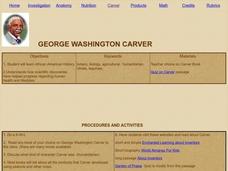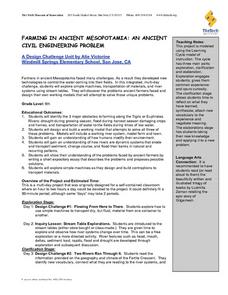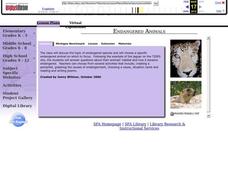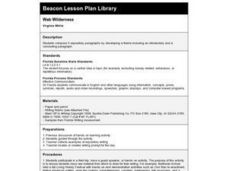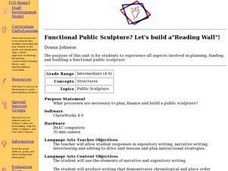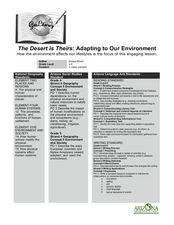Curated OER
Do You Haiku? We Do!
Third graders try their hands at writing Haiku, a form of Japanese poetry. Haiku is usually 17 syllables in three-line form. This engaging lesson has many excellent worksheets and website imbedded in the plan. They share their finished...
Curated OER
Using Word Referents
Students edit an existing piece of writing focusing of improving word choice. They create lists of words that can be used in place of the main topic and rewrite the piece using the new vocabulary.
Curated OER
Summing Up the Disaster
Young scholars are introduced to news writing being a concise, factual, and informative type of writing. They assess that publishing an article in a newspaper style utilizes a word processing program. Each student researches the Titanic...
Curated OER
George Washington Carver
Learners learn and research the life of George Washington Carver. In this historical figures instructional activity, students read a book on George Washington Carver, discuss his character and the challenges he faced in becoming a...
Curated OER
KWL Chart
Students use a KWL Chart. In this lesson, students will have a blank KWL, or what do I know, what do I want to learn, and what did I learn chart. Students get to there the other students in their class by filling it out the KWL chart and...
Curated OER
History Repeats Itself
Twelfth graders research historical turning points, gather-data, and extrapolate possible alternate outcomes. They work individually to choose one historical event from Attachment D, Historical Turning Points. Students complete either...
Curated OER
The Use of Language in "I Know Why the Caged Bird Sings"
Readers of I Know Why the Caged Bird Sings are asked to craft an essay in which they compare how Maya Angelou uses figurative language to depict herself and Mrs. Flowers.
Curated OER
The Trial of the Bloody Sucker
A blood sucking what? Grade schoolers identify the characteristics of blood sucking parasites. They organize their information, identify their arguments, and present them to the class in persuasive arguments. They participate in a debate...
Curated OER
Panama Canal
Learners investigate a way to sail a boat around the world without touching land while learning about the Panama Canal. In this Panama Canal lesson plan, students learn about the relationship of socio-political continents and how the...
Curated OER
Farming in Ancient Mesopotamia: An Ancient Civil Engineering Problem
Sixth graders identify the major obstacles in farming in Mesopotamia. They work together to design and build a model that solves these problems. They write a short essay that describes the problems and their possible solutions.
Curated OER
Endangered Animals
Students listen to a teacher led lecture on jaguars, their habitats, and how they became endangered. Using a specified web site, they choose an endangered animal to research. After gathering information, students participate in...
Curated OER
Summarization Superstars
How do you read when you know you're going to be summarizing a text? Summarize a nonfiction text with your upper elementary schoolers. Your pupils independently read a nonfiction article and write a summary paragraph using the six-step...
Curated OER
Web Wilderness
Fourth graders write an expository paper using notes taken during a field trip or a guest speaker.
Curated OER
SNACK TIME
Students explore writing sequential information by composing the simple recipe of peanut buttera and jelly sandwiches.
Curated OER
Introducing Nonfiction
Students are introduced to nonfiction text. In this five esson unti, students explore nonfiction as a genre. They identify the components and text structure of text structure of nonfiction text. Students read a nonfiction passage and...
Curated OER
Salon Simulation
Students examine the role of the 'Salon'. In this historic communications lesson, students role play and use discussion to enhance their understanding of the role the Salon played in 18th century Europe. Students will divide into groups,...
Curated OER
Functional Public Sculpture? Let's build a"Reading Wall"!
Students interview a brick sculptor and aid in building a brick wall. They write expository paragraphs explaining the sequential process of building a reading wall. They create reading wall sketch designs. Students carve their names and...
Curated OER
Comparing Time Periods in U.S. History: The Ashford Project
Fifth graders use a "fact book" comparing periods in American history then students create a picture to illustrate their assigned periods. # # students use their pictures and concept maps to write expository paragraphs about their...
Curated OER
Report Writing in Primary Grades
Students listen and restate facts from a text. They gather and organize information as a class. They create a report and present it to their classmates.
Curated OER
What Do You Do With An Orphaned Cheetah?
Students brainstorm techniques for teaching baby cheetahs survival skills. In this science lesson, students view an episode of "Cheetah Orphans" and work together to analyze the situation and develop a plan to teach the baby cheetahs the...
Curated OER
Raptors: Senses and Influences
Young scholars compare the traits of humans to raptors. In this senses and beneficial traits lesson students create a newsletter and compare raptors to aircraft.
Curated OER
Synthesis of Information
Locating and synthesizing information is an essential part of the research process but can be overwhelming for many young writers. Eliminate some of the stress and confusion, this resource suggests, by separating these steps. To focus...
Curated OER
Forms Of Knowledge
Learners put writing pieces into categories to show different organizational features in writing. In this writing lesson plan, students are shown examples of speeches, poems, editorials, cartoons, parodies, historical fiction, and more.
Curated OER
The Desert is Theirs: Adapting to Our Environment
Young scholars determine how animals and people adapt to the desert environment. In this desert lesson, students review vocabulary about the desert and how humans have to make changes to accommodate their environments. They listen to and...





